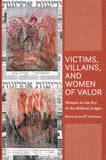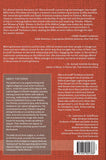The book of Judges depicts a bleak period in the history of the Israelites, characterized by a recurrent cycle of sin, servitude, repentance, and temporary redemption as the Israelites repeatedly fall into the pagan practices of their neighbors. The concluding chapters of Judges portray the Israelites at a shocking moral nadir—committing all three cardinal sins of idolatry, illicit relations, and murder. This difficult, tumultuous period forms the background for the narratives of most of the women studied in this book. The end of the era of the judges does not coincide, however, with the end of the book of Judges. The despair of its final chapters recedes before the optimistic opening chapters of 1 Samuel, in which long-suffering Chana gives birth to Samuel, who will be the last judge of Israel and who will anoint its first two kings. Under the leadership of Chana’s son, the Israelites will begin a long-lasting spiritual and moral recovery.
The many narratives explored in this book, beginning with three early narratives from the book of Joshua and ending with the story of Chana, form a rich tapestry of women who lived during the nearly four centuries between the Israelites’ entry into Canaan and the anointing of the first Israelite king. The narratives portray both women in their traditional roles and women who step outside of those roles. They include mothers, daughters, wives, widows, and concubines, pious women and ungodly ones, prophets and prostitutes, a judge and a femme fatale. Some are named; others remain nameless. Some are Israelites; others are Canaanites and Philistines. Some are charismatic figures who exert a major influence on their world; others are powerless, pitiful victims, destroyed by the men in their lives. These women can be grouped in three categories: victims, villains, and women of valor.
Through the lens of ancient and contemporary traditional commentators who analyze these women’s thoughts, words, and actions, we can deepen our understanding of them and, perhaps, of ourselves.
ABOUT THE AUTHOR:
Shera Aranoff Tuchman has been teaching a weekly class on women in the Bible at Congregation Kehilath Jeshurun in New York for almost twenty-five years. These lectures, based on traditional biblical commentary, provided the material for this book as well as for Passions of the Matriarchs and Moses’ Women. Tuchman also translated and edited the diaries of her grandmother Bina Appleman, published as Safta’s Diaries: Intimate Diaries of a Religious Zionist Woman.
Dr. Aranoff is in the private practice of Dermatology and on staff at Lenox Hill Hospital. She has been selected yearly by Castle Connolly as a Top Doctor in the New York Metro Area guide for the past twenty years. She was interviewed on the CUNY television series “Jewish Women in America.”
Aranoff Tuchman and her husband, Dr. Alan Tuchman, live in Manhattan and spend their free time with their children and grandchildren.
For almost twenty-five years, Dr. Shera Aranoff, a practicing dermatologist, has taught Bible every Thursday morning to a women’s class numbering as many as fifty students. Her astonishing breadth and depth of textual analysis, based on Talmud, Midrash, classical commentaries and modern scholarship, bring the text and the personalities to life in a riveting fashion that is both informative and inspiring. Victims, Villains, and Women of Valor: Women in the Era of the Biblical Judges now makes her analysis available to all. Take the time to study this book and become a virtual student in Shera Aranoff Tuchman’s class, reading the Bible as never before, through the eyes of a master teacher.
—Rabbi Haskel Lookstein
Rabbi Emeritus, Congregation Kehilath Jeshurun, New York City
Moving between harlotry and heroism, biblical women save their people in dangerous times and earn rabbinic praise for the adroit way they navigate the crises of their lives. Aranoff Tuchman writes with scholarship and flair, engaging the reader in the world of traditional commentary on the biblical text. She discusses the varied readings offered by a range of commentaries. What emerges is a dramatic narrative of women-leaders in the process of creating history.
—Dr. Avivah Gottlieb Zornberg
Author of Moses: A Human Life, Yale University Press
Shera Aranoff Tuchman presents a fascinating series of studies of biblical passages regarding women from the period of the Judges, some well-known but some hardly noticed. The work more than justifies its title, since, based on traditional Jewish interpretation, it provides nuanced presentations of women of all kinds, those who suffered evil, those who perpetrated it, and those who rose to redemptive roles. A fascinating way to study Tanach.
—Dr. Lawrence H. Schiffman
Judge Abraham Lieberman
Professor of Hebrew and Judaic Studies
Skirball Department of Hebrew and Judaic Studies
Director of the Global Network for Advanced Research in Jewish Studies New York University




